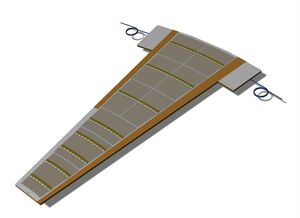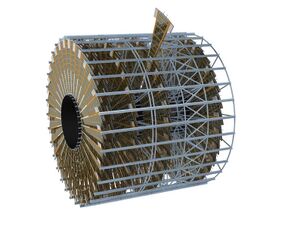Difference between revisions of "Upgrade"
| Line 12: | Line 12: | ||
The new tracker should be up and running in 2024, but the project is so challenging and complicated that work has to start now (or even yesterday) to have any hope of being ready in time. Current work focusses on the basic design issues: how to make very low radiation length, stable support structures. We investigate petals (pictured) for the strip end-cap. Petals combine cooling and support tasks in one structure to save material. We also work on reducing the material in the global support (pictures), and on how to simplify assembly and maintenance. | The new tracker should be up and running in 2024, but the project is so challenging and complicated that work has to start now (or even yesterday) to have any hope of being ready in time. Current work focusses on the basic design issues: how to make very low radiation length, stable support structures. We investigate petals (pictured) for the strip end-cap. Petals combine cooling and support tasks in one structure to save material. We also work on reducing the material in the global support (pictures), and on how to simplify assembly and maintenance. | ||
| − | + | Ease of assembly is particularly important for Nikhef since we have ambitions to assemble one of the two endcaps at Nikhef. For this we work closely with DESY, who plan to build the other end-cap. | |
[[Image:Endcapstrip6small.jpg|thumb|Turbo-fan end-cap support structure]] | [[Image:Endcapstrip6small.jpg|thumb|Turbo-fan end-cap support structure]] | ||
---- | ---- | ||
| + | |||
==Links== | ==Links== | ||
Revision as of 09:43, 13 October 2011
Nikhef ATLAS Upgrade Wiki
Contact: Nigel
Project overview
Nikhef works on the ATLAS Upgrade Project, especially on the new inner tracker and concentrating on the end-cap engineering.
The new inner tracker has to identify and measure charged tracks at the sLHC, the planned improved LHC which should deliver 5 times the LHC interaction rate.
The new tracker should be up and running in 2024, but the project is so challenging and complicated that work has to start now (or even yesterday) to have any hope of being ready in time. Current work focusses on the basic design issues: how to make very low radiation length, stable support structures. We investigate petals (pictured) for the strip end-cap. Petals combine cooling and support tasks in one structure to save material. We also work on reducing the material in the global support (pictures), and on how to simplify assembly and maintenance.
Ease of assembly is particularly important for Nikhef since we have ambitions to assemble one of the two endcaps at Nikhef. For this we work closely with DESY, who plan to build the other end-cap.
Links
Inner Tracker Radiation Levels studies, Ian Dawson
Endcap Strips Common Wiki at CERN
Nikhef Engineering Drawings for the Endcap Strips

